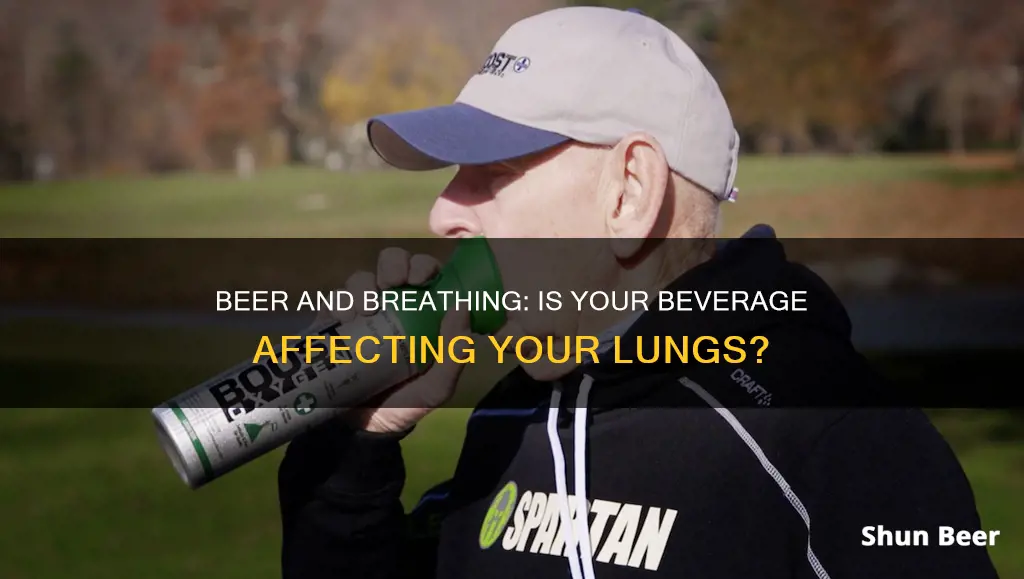
Drinking alcohol can have a range of effects on the body, and shortness of breath is one of them. This can be caused by a number of factors, including allergic reactions, asthma, alcohol-induced respiratory depression, sleep apnea, and more. While alcohol-related breathing issues are usually temporary, they can be very uncomfortable and even dangerous in some cases. Understanding the causes and risk factors can help individuals take the necessary precautions and seek medical advice if needed.
| Characteristics | Values |
|---|---|
| Cause of shortness of breath | Allergic reaction, asthma attack, alcohol-induced respiratory depression, sleep apnoea, lung infections, impaired lung function, pneumonia, alcohol poisoning, COPD, ACM |
| Risk factors | Heavy drinking, drinking alongside opioids and tranquilisers, pre-existing respiratory conditions, snoring, asthma, COPD, ACM, high levels of sulphites and histamines in alcoholic drinks |
| Treatment | Antihistamines, over-the-counter supplements, responsible drinking, reducing alcohol intake, choosing lower-alcohol alternatives, seeking medical help |
What You'll Learn
- Alcohol can worsen respiratory conditions such as asthma or COPD
- Alcohol can cause an allergic reaction, triggering wheezing and coughing
- Alcohol affects the cardiovascular system, which can lead to shortness of breath
- Alcohol can cause dehydration, reducing the volume of blood circulating in the body
- Alcohol can impact sleep by increasing drowsiness and relaxing upper airway muscles, potentially causing sleep apnoea

Alcohol can worsen respiratory conditions such as asthma or COPD
Alcohol can be an asthma trigger, and some people with asthma are sensitive to substances found in alcoholic drinks, such as sulphites and histamines. Sulphites are preservatives that are commonly used in wine, beer, and cider, and are also naturally produced during the making of these drinks. Extra sulphites are added to stop bacteria from growing. Histamine is a chemical released in the body during an allergic reaction, and it is also found in many alcoholic drinks.
One study found that alcohol had triggered an asthma attack on at least two occasions in 33% of people, with wine being the most common trigger. Most alcohol-related asthma symptoms started within an hour of drinking.
For those with COPD, alcohol can also worsen breathing. Alcohol is known to slow down the breathing rate, causing respiratory depression. It also dilates the blood vessels, which increases blood flow and leads to a faster heartbeat, affecting the breathing rate and causing shortness of breath. Alcohol also has a direct effect on the central nervous system, causing muscles in the body to relax, which can make breathing more difficult. Additionally, alcohol causes dehydration, decreasing the volume of blood circulating in the body, and this can lead to a reduction in the amount of oxygen reaching the lungs and other tissues.
Ginger Beer: A Standalone Beverage?
You may want to see also

Alcohol can cause an allergic reaction, triggering wheezing and coughing
Allergic reactions to alcoholic drinks can vary depending on the type of drink. Wine, for example, is the most commonly reported trigger for adverse responses, with sensitivities often due to pharmacological intolerances to specific components such as biogenic amines and sulphite additives. Beer also contains sulphites that could potentially trigger asthma symptoms. In addition, alcoholic drinks with high tannin levels, such as red wine, beer, and whiskey, can exacerbate alcohol flush conditions, making it harder to breathe.
It is important to note that not everyone experiences shortness of breath after drinking alcohol, and the severity can vary from person to person. However, for those who do experience it, it can be concerning. If you experience persistent chest pain, tightness, or difficulty breathing after consuming alcohol, it is recommended to seek medical advice.
In some cases, an allergic reaction to alcohol may be due to a genetic condition where the body cannot break down alcohol efficiently. This is more common in individuals of Asian descent, who have a reduced capacity to metabolize acetaldehyde, a byproduct of ethanol metabolism. As a result, they may experience adverse reactions such as facial flushing, urticaria, systemic dermatitis, and alcohol-induced respiratory reactions, including rhinitis and bronchoconstriction.
To prevent allergic reactions, it is essential to avoid alcohol or identify and avoid specific substances or ingredients that trigger reactions. Reading beverage labels and choosing drinks with lower alcohol content or diluted solutions can help manage allergic responses. Additionally, antihistamines and over-the-counter supplements designed to reduce alcohol flush may provide relief from allergic symptoms.
Celiac-Friendly Beers: Can Corona Be on the Menu?
You may want to see also

Alcohol affects the cardiovascular system, which can lead to shortness of breath
Drinking beer or any alcoholic beverage can lead to shortness of breath. While the exact cause is not fully understood, it is believed that alcohol affects the cardiovascular system, which can lead to shortness of breath.
Alcohol causes the dilation of blood vessels, which leads to a drop in blood pressure and a reduction in the amount of oxygen passing into the lungs, making breathing more difficult. This effect is particularly pronounced in people with pre-existing respiratory conditions such as asthma or chronic obstructive pulmonary disease (COPD). Alcohol is known to worsen these conditions, triggering wheezing, coughing, and difficulty breathing.
In addition, alcohol is a depressant that directly affects the central nervous system, causing the muscles in the body to relax, including those involved in breathing. This disruption to the balance between oxygen and carbon dioxide in the body can further contribute to shortness of breath.
Alcohol also causes dehydration, decreasing the volume of blood circulating in the body. This can lead to a situation where the lungs and body's tissues do not receive enough oxygen, resulting in feelings of breathlessness.
For people who drink excessively, there is a risk of developing alcohol addiction, which is associated with respiratory problems. Excessive alcohol consumption can slow down the breathing rate, a condition known as respiratory depression. Additionally, heavy drinking over a prolonged period can lead to a condition called alcoholic cardiomyopathy, where the heart muscle becomes enlarged and weakened. This condition can cause shortness of breath, fatigue, weakness, abnormal heartbeat, and swelling of the legs and ankles.
Therefore, it is important to understand the impact of alcohol on breathing and to avoid excessive consumption. If you experience shortness of breath after drinking alcohol, it is recommended to seek medical advice, especially if it persists or is accompanied by other symptoms such as chest pain or tightness.
Beer and NCWS: What's the Verdict?
You may want to see also

Alcohol can cause dehydration, reducing the volume of blood circulating in the body
Alcohol can cause dehydration, which reduces the volume of blood circulating in the body. This can lead to shortness of breath for several reasons. Firstly, dehydration caused by alcohol consumption can thicken the blood, making it harder for the heart to pump oxygenated blood around the body. This can result in a faster heart rate, which in turn can lead to shortness of breath. Additionally, dehydration can cause a decrease in lung capacity, making it more difficult to breathe.
Moreover, alcohol is a diuretic, meaning it increases urine production and fluid loss. This can further contribute to dehydration and the associated reduction in blood volume. The body attempts to compensate for this by increasing the heart rate, which can lead to shortness of breath. Furthermore, dehydration can cause the airways to narrow, making it more difficult for air to flow in and out of the lungs, resulting in laboured breathing.
The effects of alcohol on the body's fluid balance can also impact the lungs' ability to clear mucus and contaminants. Alcohol disrupts the mucociliary transport system, which is responsible for clearing mucus and contaminants from the airways. This can lead to a buildup of mucus in the lungs, making it more difficult to breathe.
In addition, alcohol can cause the blood vessels to dilate, which lowers blood pressure and reduces the amount of oxygen passing into the lungs. This can make breathing more difficult and contribute to shortness of breath.
Finally, dehydration caused by alcohol consumption can impact the nervous system, including the nerves that control breathing. This can lead to disruptions in the normal breathing pattern, resulting in shortness of breath.
Beer and Fun: Chuck E. Cheese, Atlanta Style!
You may want to see also

Alcohol can impact sleep by increasing drowsiness and relaxing upper airway muscles, potentially causing sleep apnoea
Alcohol is a central nervous system depressant that can slow down breathing and relax the muscles in the throat, making it easier for the upper airway to collapse and block airflow. This can lead to snoring and complete airway obstruction, known as sleep apnoea. Sleep apnoea is a sleep disorder characterised by repeated breathing disruptions during sleep, resulting in loud snoring and occasional gasping or choking sounds. It can also cause daytime sleepiness and low energy.
Research has shown that alcohol consumption increases the risk of developing obstructive sleep apnoea (OSA) and worsens symptoms in those already diagnosed with the condition. OSA is the most common type of sleep apnoea, occurring when soft tissues in the back of the throat collapse and block the airway during sleep. Alcohol can also worsen central sleep apnoea (CSA), a disorder where the brain fails to send proper signals to the respiratory muscles.
The effects of alcohol on sleep apnoea are more pronounced when consumed in the evening or shortly before bed, as blood alcohol levels remain elevated during sleep, increasing the impact on breathing. Additionally, the amount of alcohol consumed matters, with larger amounts heightening the risk of breathing obstructions.
For individuals with sleep apnoea, it is recommended to abstain from alcohol or at least avoid consuming it a few hours before bedtime. Continuous positive airway pressure (CPAP) treatment can help reduce the effects of alcohol on OSA, but compliance with this treatment is often lower among those who drink frequently.
Beer Overload: Stinging Sensation in Pee?
You may want to see also
Frequently asked questions
Yes, drinking beer can cause shortness of breath. Alcohol is a central nervous system depressant and has been shown to influence breathing from the moment it is consumed.
Alcohol slows down the central nervous system, resulting in a slower breathing rate and shallower breaths. This is known as alcohol-induced respiratory depression.
Alcohol can trigger asthma and worsen symptoms such as coughing, itching, and shortness of breath. It can also lead to sleep apnea, a sleep disorder characterised by intermittent breathing pauses during sleep.
It is recommended to drink in moderation and at a slow rate to give the body time to process the alcohol effectively, reducing the risk of breathing complications. The recommended limit for moderate alcohol consumption is generally one drink per day for women and up to two drinks for men.
If you experience shortness of breath after drinking beer, it is important to stop drinking and consult a doctor. This may be a sign of an underlying condition or an allergic reaction.







